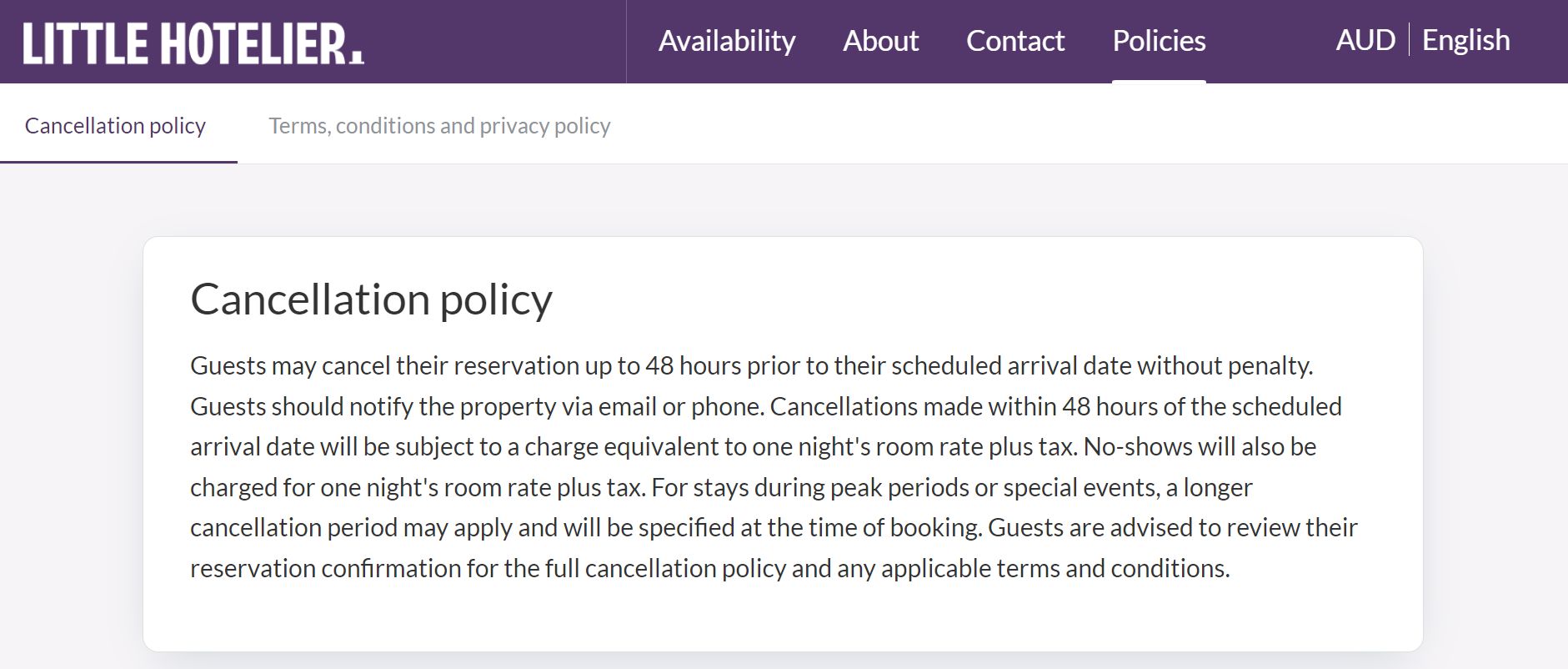What is a hotel cancellation policy?
Hotel cancellation policies offer hotel guests the opportunity to cancel their booking up until a certain amount of days before check-in. Once this date has passed, the hotel might charge the guest a set cancellation fee, a percentage of the booking, or the full amount.
Never stress over a cancellation again
Beautifully display your hotel cancellation policy in a direct booking calendar that allows you to send personalised emails automatically.
Learn moreA booking cancellation policy serves two main functions:
- It holds guests accountable, and ensures that they only book a hotel room when they actually intend to stay (rather than booking a room ‘just in case’, or reserving two options for the same date).
- It helps to reduce the number of no-shows, ensuring that a hotel doesn’t lose too much revenue from avoidable vacancies.
What is the importance of having a clear booking cancellation policy?
A clear cancellation policy is critical because this is essentially a legal document – one designed to protect your business and offer transparency to your guests. If it is vague, if it has mistakes, or if it offers any wriggle room, resourceful guests could find loopholes and leave you out of pocket.
But while your hotel booking cancellation policy needs to be legally sound, it can’t be written in lengthy legalese. Your average guest needs to understand it easily, and the most important terms – the timeframes and applicable cancellation fees – need to be displayed clearly.
Understanding hotel cancellation policy fine print
For independent hoteliers, your fine print should explicitly define the ‘cut-off’ time, e.g. 2:00pm local time the day before arrival, to avoid any ambiguity regarding time zones or late-night cancellations. It must also clearly state whether a deposit is non-refundable or if it can be converted into a credit for a future stay, to ensure that your revenue is protected even when a guest’s plans change.
It’s also important to clarify who the merchant of record is for each booking – whether guests are charged directly by your hotel or by an online travel agency like Booking.com. This determines who processes refunds and who guests should contact if they need to dispute a charge. Making this explicit in your policy helps prevent confusion and protects your team from handling issues that belong with a third-party platform.
What is an example of a hotel cancellation policy?

Marriott cancellation policy
Marriott generally requires guests to cancel their reservation by midnight at least 48 hours before their scheduled arrival to avoid penalties. If a guest misses this window, the standard fee is typically equivalent to the cost of one night’s room rate (plus tax). Marriott’s luxury properties and its ‘Advance Purchase’ rates can carry much stricter, non-refundable terms.
Hilton vs Hyatt cancellation policies
Both Hilton and Hyatt have moved toward a 48-hour cancellation window as their baseline for flexible rates in the US market. Hilton typically charges a one-night penalty for late cancellations, though some high-demand locations can extend this requirement to 72 hours. Hyatt follows a similar 48-hour structure, but provides a “loyalty perk” for top-tier members that allows them to cancel up to 24 hours before check-in. This demonstrates that the 48-hour window has become standard for the industry, and should be used as a baseline by small, independent hotels.
Booking.com hotel cancellation policy
Unlike the fixed policies of big chains, Booking.com operates on a host-driven model where each hotelier sets their own rules. Operators can choose from standardised templates such as ‘Fully Flexible’ (free cancellation until a set time), ‘Non-refundable’/’Partially-refundable’ (the guest pays all/some of the booking amount regardless of when they cancel).
Booking.com also offers a ‘Risk-Free’ program where they take responsibility for finding a replacement guest if a cancellation occurs within a specific window, which can be a useful tool for smaller properties, though does incur extra costs.
Compared with Booking.com’s template‑based system, your direct booking site gives you full control over cancellation wording, penalties and flexibility, allowing you to mirror familiar structures (like ‘Fully Flexible’ or ‘Non-refundable’) while keeping your most guest‑friendly rules for direct bookers.
What is the difference between hotel cancellation policies vs Airbnb cancellation policies?
If you are planning to list your property on Airbnb alongside your direct booking site, you should know that the platform uses a fixed set of standardised cancellation policy categories. While you have total control over the wording of your direct booking cancellation policies, Airbnb and other booking sites typically require you to select from their specific tiers. This can become a tradeoff between financial protection and your hotel’s visibility on the platform.
Airbnb’s main short-term policies include:
- Flexible: Guests get a full refund if they cancel up to 24 hours before check-in.
- Moderate: Full refund for cancellations up to five days before check-in.
- Firm: Full refund for cancellations up to 30 days before check-in.
- Strict: Full refund if the cancellation is made within 48 hours of booking and at least 14 days before check-in.
A primary difference lies in enforcement. While a hotelier might manually waive a fee for a guest they have spoken with, Airbnb typically automates these refunds (though you can manually override them). Airbnb listings with more flexible policies also tend to enjoy a higher ranking in the search results.
What are the different types of hotel cancellation policies?
Hotels typically choose from several cancellation policy types based on their business needs. The most common include free cancellation (allowing changes up to a certain deadline), non-refundable (no refund upon cancellation), and partially refundable policies (percentage-based refunds). Hotels often implement stricter policies for group bookings, special events, or peak seasons, while force majeure policies provide flexibility for circumstances beyond guest control like natural disasters.
The impact of policy choice:
- Average hotel booking cancellation rates range between 18% and 42%, depending on region and distribution channel.
- Hotels that switched from strict to flexible cancellation policies saw at least a 10% increase in reservations, based on Airbnb host data.
- A flexible cancellation policy was seen as a requirement by 70% of travellers in 2024.
As a hotelier, you have the choice of a number of different cancellation policy options. Some of the most common are:
1. Free cancellation policy
What does ‘free cancellation’ on a hotel booking actually mean? In the simplest terms, it indicates that a guest can cancel without paying a penalty. But ‘free’ cancellations are almost always bound by strict cut-off times, after which standard cancellation fees will apply.
Three decades ago free cancellations of reservations in hotels were common, but they are now a rarity, as the internet has made it far quicker and easier to book a hotel, which has increased instances of travellers making bookings ‘just in case’. In a way, ‘free cancellation’ has become a marketing tool used to encourage early bookings. It’s a trade-off: free cancellation attracts more guests, but it also increases the risk of last-minute ‘no-shows’ that can leave rooms empty during peak periods. This risk can be balanced out by applying higher rates to free cancellation bookings versus ‘non-refundable’ options.
2. Non-refundable policy
Sitting at the opposite end of the spectrum, a non-refundable cancellation policy takes full payment from the customer. Hotels may choose to implement this policy when a guest decides to cancel particularly late, such as in the 24 hours before check in.
3. Partially refundable policy
More common than non-refundable policies, partial refund policies see the guest refunded a percentage of the total reservation value in the days leading up to their stay. This percentage may decrease as check-in approaches.
4. One night penalty
Another common form of partial refund, ‘one night penalty’ policies see the guest charged for the first night of their cancelled stay.
5. No-show policy
Sometimes guests won’t cancel, but will simply fail to show up. In these cases a hotel might choose to charge the full total, a percentage of the total, one night, or a set cancellation/no-show fee.
6. Group cancellation policy
Hotels stand to lose more on group cancellations than individual cancellations, so may choose to implement a stricter policy for groups, e.g. a non-refundable policy that stretches 14 days before check-in.
7. Minimum stay policy
Many hotels have a minimum stay policy, particularly during peak periods. In cases of cancellation, no shows or if a guest wants to cut their stay short, a hotel may choose to base the cancellation fee on the minimum stay.
8. Seasonal cancellation policy
Similar to minimum stay policies, seasonal cancellation sees a hotel’s cancellation policy tighten during peak periods, to ensure the property minimises losses during the most profitable times of year.
9. Force majeure policy
Hotels will often be more lenient when the cancellation is out of the guest’s hands. Force majeure policies cover cancellations due to natural disasters or government restrictions, such as those during COVID. Force majeure cancellations are generally free.
10. Special event cancellation policy
If a guest is hosting a special event at a hotel, such as a wedding or business conference, stricter cancellation policies will usually apply.
Key takeaways
- Your choice of cancellation policy should balance guest expectations, your ability to generate bookings, and hotel revenue protection.
- Policies can range from free cancellation and partial refunds to strict non-refundable bookings and penalty charges.
- Special circumstances like groups, peak seasons or force majeure can demand policy flexibility or customisation.
What are the key components of a hotel cancellation policy?
The key components of a hotel cancellation policy include clear rules outlining deadlines, deposits, fees and refunds. On a more general level, the policy must be easily accessible to guests, displayed on your website, in confirmation emails and at your front desk. It also needs to be crystal clear and easy to understand.
In terms of the content, it should feature the following elements:
- Deadlines: You need to be clear on when cancellation fees will begin to incur. State the requirements and deadline for free cancellation, and describe further deadlines that may change the level of cancellation fee.
- Cancellation fees: Clearly state the cancellation fees that a guest will face at different deadlines and in different situations.
- Deposit: If you don’t take payment for the full booking amount upfront, state how much the deposit will be, and the degree to which it is refundable/non-refundable.
- Refund policy: Describe exactly how and when refunds will be issued.
- No-show policy: Describe fees/refunds in cases where a guest simply doesn’t show up.
- Modification: Guests often confuse modifying dates with cancelling. You must define whether moving a booking to a later date is treated as a ‘free modification’ or if it triggers a penalty, especially if the new dates fall under a higher rate.
- Flexible rates: These rate plans offer longer cancellation windows, sometimes up to the day of arrival. Offering a ‘flexible rate’ helps conversions by attracting risk-averse travellers willing to pay a slightly higher price for peace of mind.
- Advance purchase rate: These are typically non-refundable and pre-paid rates offered at a discount. You should explain the trade-off between value and flexibility to help guests make the right choices.
- Guest add-ons: Clearly state whether add-ons like breakfast or extra beds are refunded separately, to prevent disputes if a guest cancels their stay.
- Partial stay: Explain what happens when guests shorten their stay after checking in. If early check-out fees apply, the rules around these should be clearly stated.
How to handle hotel cancellations and rebookings?
The best way to handle hotel cancellations and rebookings is with flexibility. While strict policies may protect short-term revenue, offering options like free cancellation windows or rebooking credits maintains goodwill, enhances your reputation, and encourages guests to return.
Most large hotel chains offer free cancellation up to 24 hours before check-in because they understand the long-term value of customer loyalty over short-term revenue protection. For small properties, this approach can be even more powerful since personal relationships and word-of-mouth matter more.
Setting the deadline based on your hotel local time
One of the most frequent causes of guest disputes is a misunderstanding of the ‘cut-off’ time, particularly for international travellers. To prevent confusion, and to ensure guests can’t claim they were misled, you should explicitly state that all cancellation deadlines are based on your local time zone, e.g. ‘cancellations must be made by 2:00pm local time [GMT] the day prior to arrival’.
What are practical strategies for handling cancellations?
- Respond quickly and empathetically – Acknowledge cancellations within hours, not days. A prompt, understanding response often matters more than the actual policy outcome.
- Create exception protocols – Document how to handle medical emergencies, family deaths, or travel disruptions. Empowering staff with clear guidelines for these situations prevents inconsistent responses.
- Use cancellations as upselling opportunities – When guests call to cancel, offer to move their dates first. If they must cancel, offer a future booking incentive like a room upgrade or late checkout.
- Track cancellation reasons – Understanding why guests cancel helps you address root causes. If many cancel due to lack of parking, that’s valuable operational feedback.
Remember: a guest who cancels but feels well-treated is likely to rebook and recommend you to others. One who feels penalised, even if your policy was clear, may leave negative reviews that cost you far more than one night’s revenue.
By Shine Colcol
Shine is the SEO and Content Manager of Little Hotelier, the all-in-one software solution purpose-built to make the lives of small accommodation providers easier. With more than five years of experience and expertise in content strategy, creation, and management, Shine has produced informational content across various topics, mostly around improving daily operations and increasing business metrics. She aims to share well-researched articles in hopes of helping bed and breakfast owner-operators win more bookings and gain more control of their small property.
Table of contents
“Working with Little Hotelier has been the solution to our many problems, we've immediately modernized our administration, especially in customer service”
Owner, Hotel Santa Maria









Janifer Harland,
Property Manager
Homewood Cottages